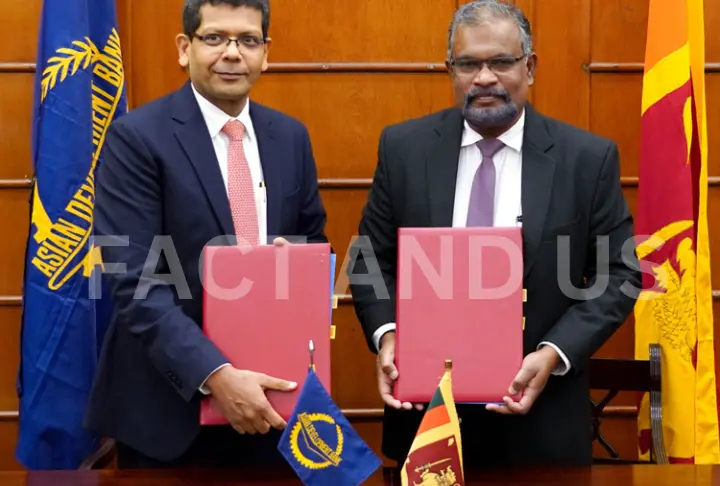MANILA, PHILIPPINES (8 December 2023) — The Asian Development Bank (ADB) approved a $200 million concessional loan to the Government of Sri Lanka to help stabilize the country’s finance sector following the sovereign debt and economic crises that started in April 2022 when it suspended its external debt payments. The Financial Sector Stability and Reforms Program comprises two subprograms of $200 million each.
Contents
Sri Lanka

Subprogram 1 targets short-term stabilization and crisis management measures that were implemented in 2023, while subprogram 2 is planned to be implemented in 2024 and focuses on structural reforms and long-term actions to restore growth in the banking sector. The program will help strengthen the stability and governance of the country’s banking sector; improve the banking sector’s asset quality; and deepen sustainable and inclusive finance, particularly for women-led micro, small, and medium-sized enterprises. According to the International Monetary Fund’s (IMF) latest review, Sri Lanka’s economy is showing tentative signs of stabilization, although a full economic recovery is not yet assured.

“The program’s overarching development objective is fully aligned with the country’s strategy of maintaining finance sector stability, while ensuring that banks are well-positioned for eventual recovery,” said ADB Country Director for Sri Lanka Takafumi Kadono. “The expected development outcome is a stable financial system providing access to affordable finance for businesses in various sectors of the economy.”
The program is a follow-on assistance from ADB’s crisis response under the special policy-based loan that was approved for Sri Lanka in May 2023. It is aligned with the fourth pillar of the IMF’s Extended Fund Facility provided to Sri Lanka to help the country regain financial stability.
It is also in line with the government’s reform agenda, including strengthening the operational independence of the Central Bank of Sri Lanka (CBSL) and its designation as the country’s macroprudential authority. In designing this subprogram 1 loan, ADB has maintained close coordination and collaboration with the IMF to design targeted regulatory reforms for the banking sector—including the asset quality review—and with the World Bank on strengthening the deposit insurance scheme.
The loan is accompanied by a $1 million grant from ADB’s Technical Assistance Special Fund to provide advisory, knowledge, and institutional capacity building for Sri Lanka’s Ministry of Finance and CBSL. ADB is committed to achieving a prosperous, inclusive, resilient, and sustainable Asia and the Pacific, while sustaining its efforts to eradicate extreme poverty. Established in 1966, it is owned by 68 members—49 from the region

Accordingly, the original credit line of USD 100 million, which is a financial intermediation loan through 10 participating financial institutions (PFIs) to eligible SME subprojects became effective in April 2016. The loan was financially closed in January 2019, 1.5 years earlier than the initial plan. It had exceeded development targets on reaching out to underserved SMEs, including women-led, first-time borrowers, and those located outside Colombo. Considering the high demand from the sector, an additional USD 75 million (the first additional financing) and a USD 9.5 million grant (the second additional financing) from We-Fi were mobilized in 2018 as further assistance to the sector.
In November 2020, the Government of Sri Lanka entered into loan and grant agreements with ADB to obtain another loan of USD 165 million and grants worth of USD 3 million from the Japan Fund for Poverty Reduction (JFPR), to provide further assistance as a credit line to SMEs.
Since 2022, the Ministry of Finance, Economic Stabilization and National Policies continuously engaged in discussions with ADB to ensure further assistance to the SME Sector which faced severe difficulties due to the effects of unprecedented COVID 19 pandemic and consequent economic crisis situation and hence, had negotiations with ADB in 2023 to mobilize USD 100 million and Technical Assistance (TA) on grant basis to finance the “Enhancing Small and Medium-sized Enterprises (SME) Finance Project” in order to further enhance SME’s access to finance.


This project is an important component of the government’s comprehensive economic reform strategy. The reform measures implemented over the last 2 years have been successful in stabilizing the economy, and in parallel, measures have been put in place to shift economic trajectory from stabilization to growth. Considering the fact that revitalisation of the SME sector is a crucial component of economic recovery, the government commenced technical discussions with ADB over a year ago in order to design this project to address key financial constraints faced by SMEs.
As the backbone of Sri Lanka’s economy, SMEs represent over 75 percent of all businesses, and contribute more than 50 percent to the country’s Gross Domestic Production (GDP). SMEs are estimated to generate employment for over 45% of the workforce, thereby creating significant spill-over impacts on the economy as a whole. Following significant challenges stemming from a series of shocks, including the COVID-19 pandemic and the prevailing economic downturn, the SME sector has faced substantial disruptions to their normal business operations largely due to factors beyond their control.

Accordingly, the Government of Sri Lanka considered it a priority to address these challenges through early interventions, of which this project is a key component. USD 50 million of the ADB financing will be allocated towards a SME line of credit loan scheme which will facilitate easier access to finance for SMEs. This will be a crucial financial injection which will support the stabilization of SMEs and set the foundation for sustainable growth and SME’s contribution to the recovery of the Sri Lankan economy.
One of the key challenges faced by SMEs in the past has been the inability to adequately utilize credit lines or concessional loan schemes due to perceived credit risk and associated requirements for collateral and guarantees. To remedy this constraint, the Government has taken a strategic step by incorporating the National Credit Guarantee Institution (NCGI) as a public limited company, to address the issue of collateral and guarantees. This initiative aims to provide partial credit guarantees for SMEs, offering them a sustainable solution to their financing challenges. USD 50 million of the ADB financing will be allocated as the Government’s initial capital infusion into the NCGI.
The Ministry of Finance, Economic Stabilization and National Policies (MOF) will be the executing agency of the above program and will implement the project in collaboration with the Department of Development Finance and NCGI. The loan agreement to borrow the above loan of USD 100 million was signed between the Government of Sri Lanka and the Asian Development Bank today at the General Treasury in Colombo. Mr. K. M. Mahinda Siriwardana, Secretary to the Treasury, and the Ministry of Finance, Economic Stabilization and National Policies, placed his signature on behalf of the Government of Sri Lanka, and Mr. Utsav Kumar, Principal Country Economist, ADB Sri Lanka Residence Mission, signed on behalf of the Asian Development Bank.
What is ADB in finance?
The Asian Development Bank (ADB) is a regional development bank headquartered in Manila, Philippines. The bank was set up in 1966 under the leadership of Japan as one of the first industrialized states in Asia. The ADB finances development projects in its member states across Asia.
What are the financial resources of Asian Development Bank?
ADB obtains its funding by issuing bonds on the world’s capital markets. It also relies on the contributions of member countries, retained earnings from lending operations, and the repayment of loans.
